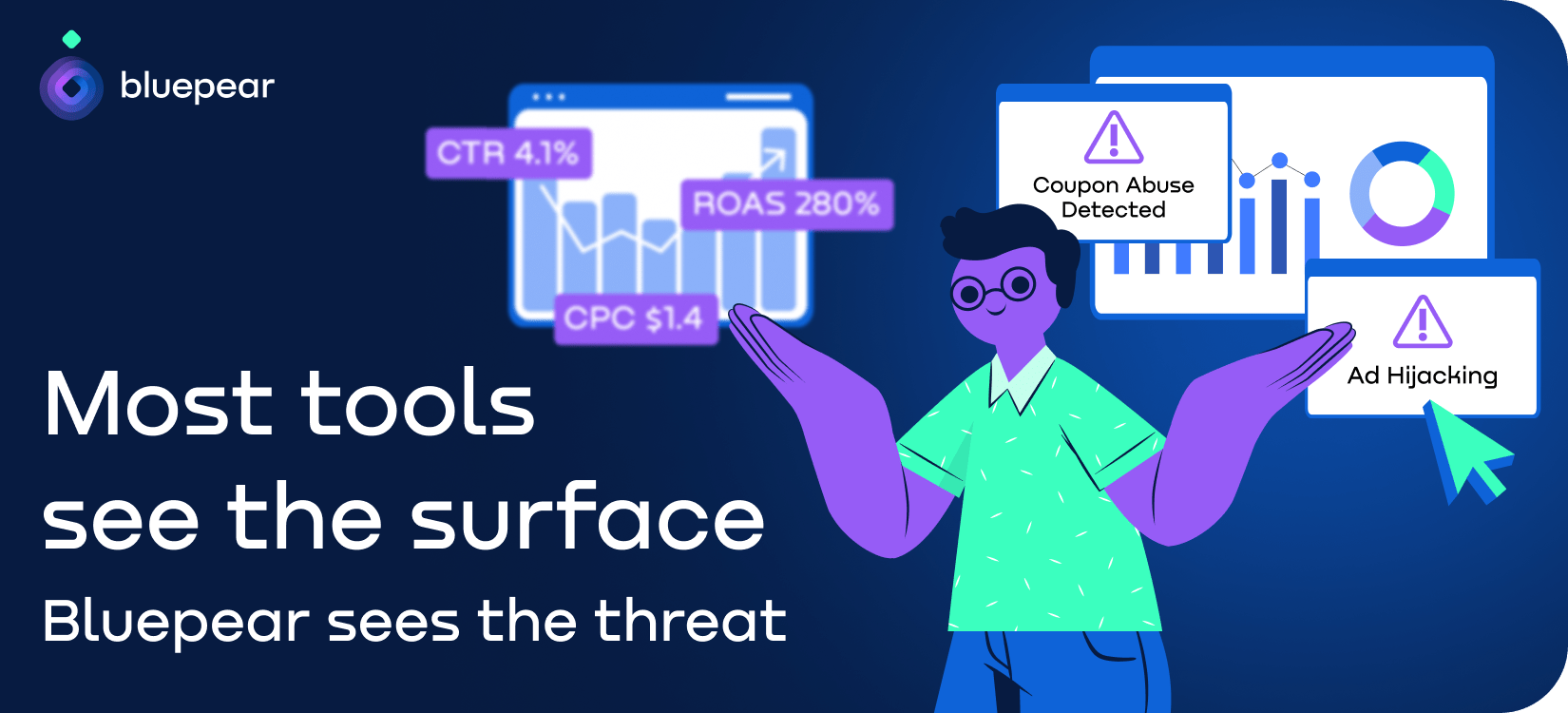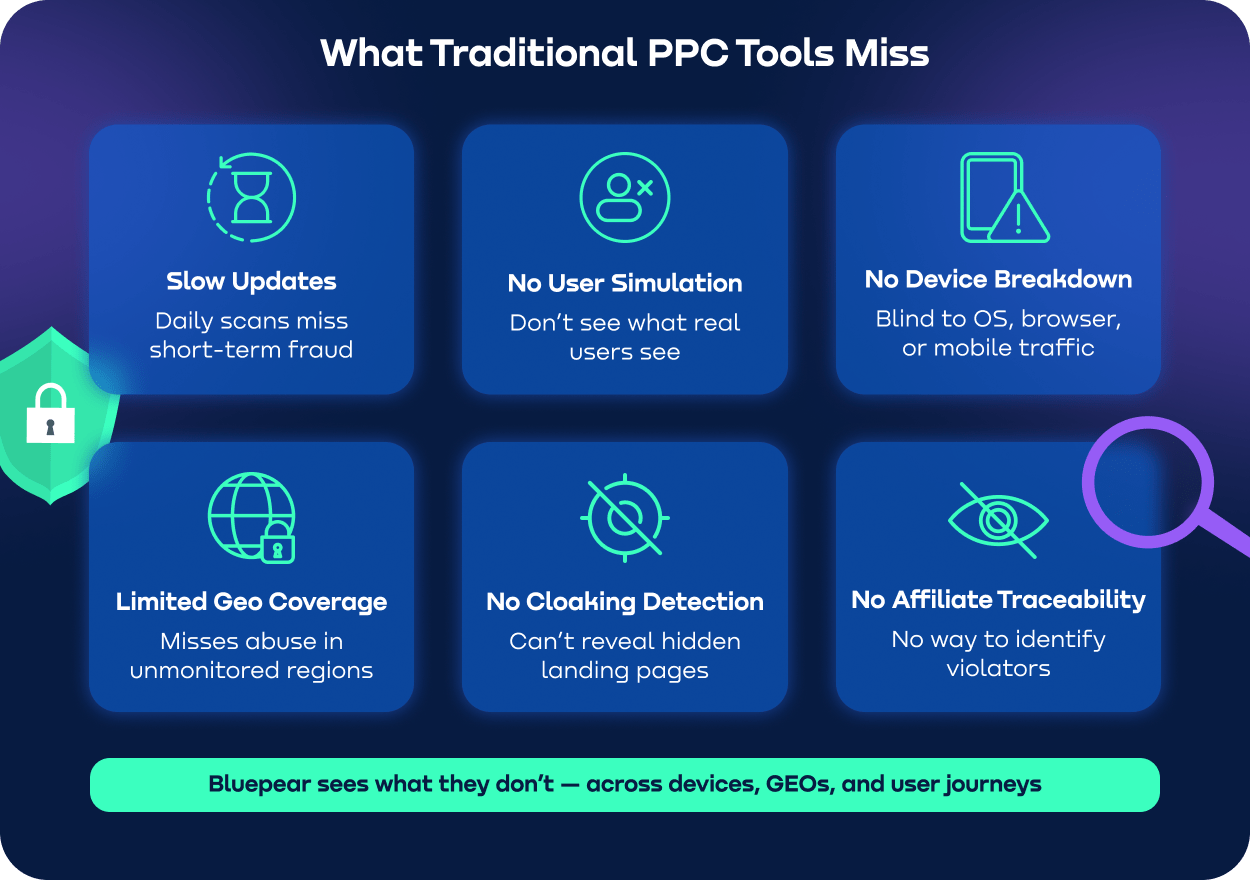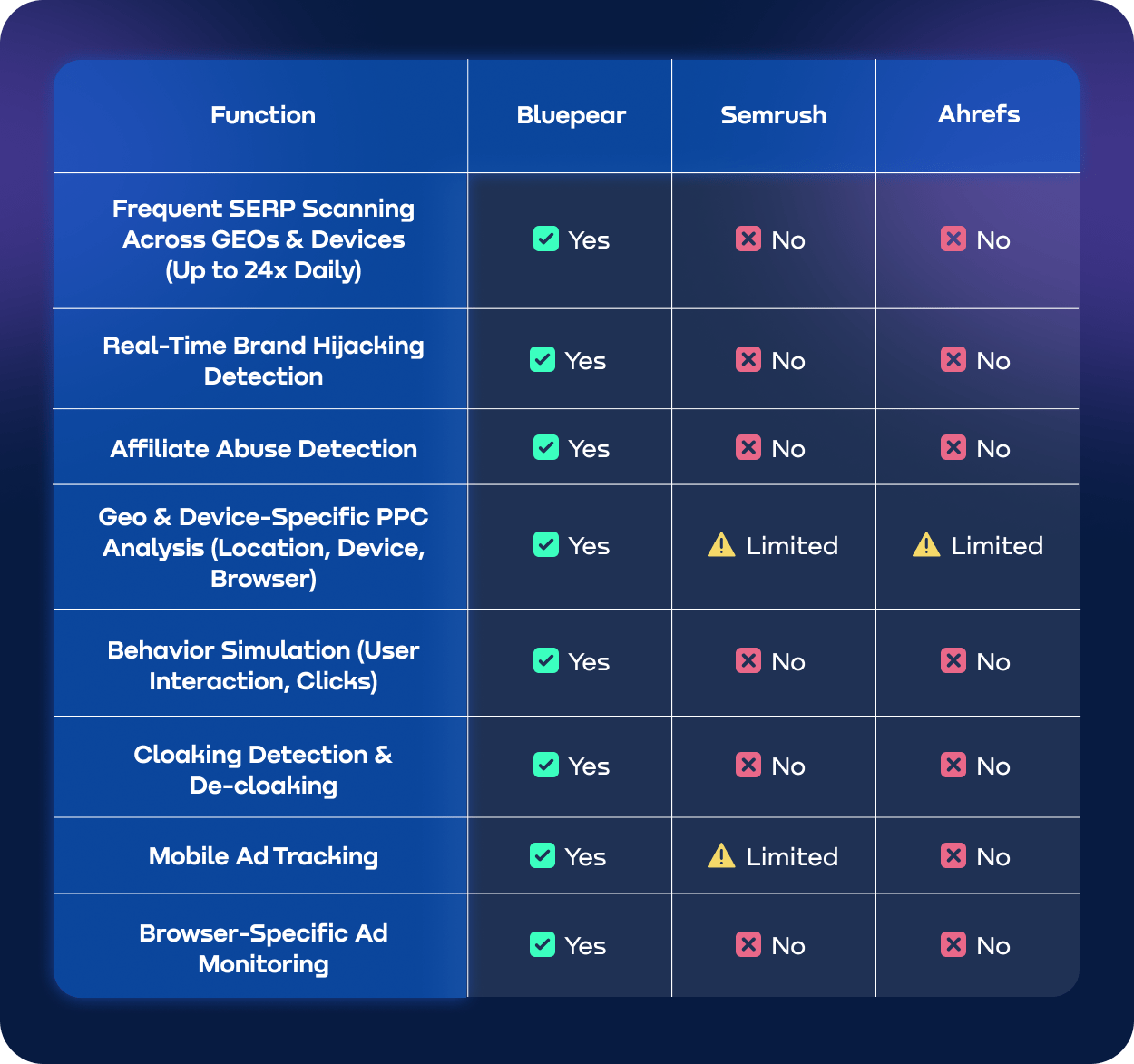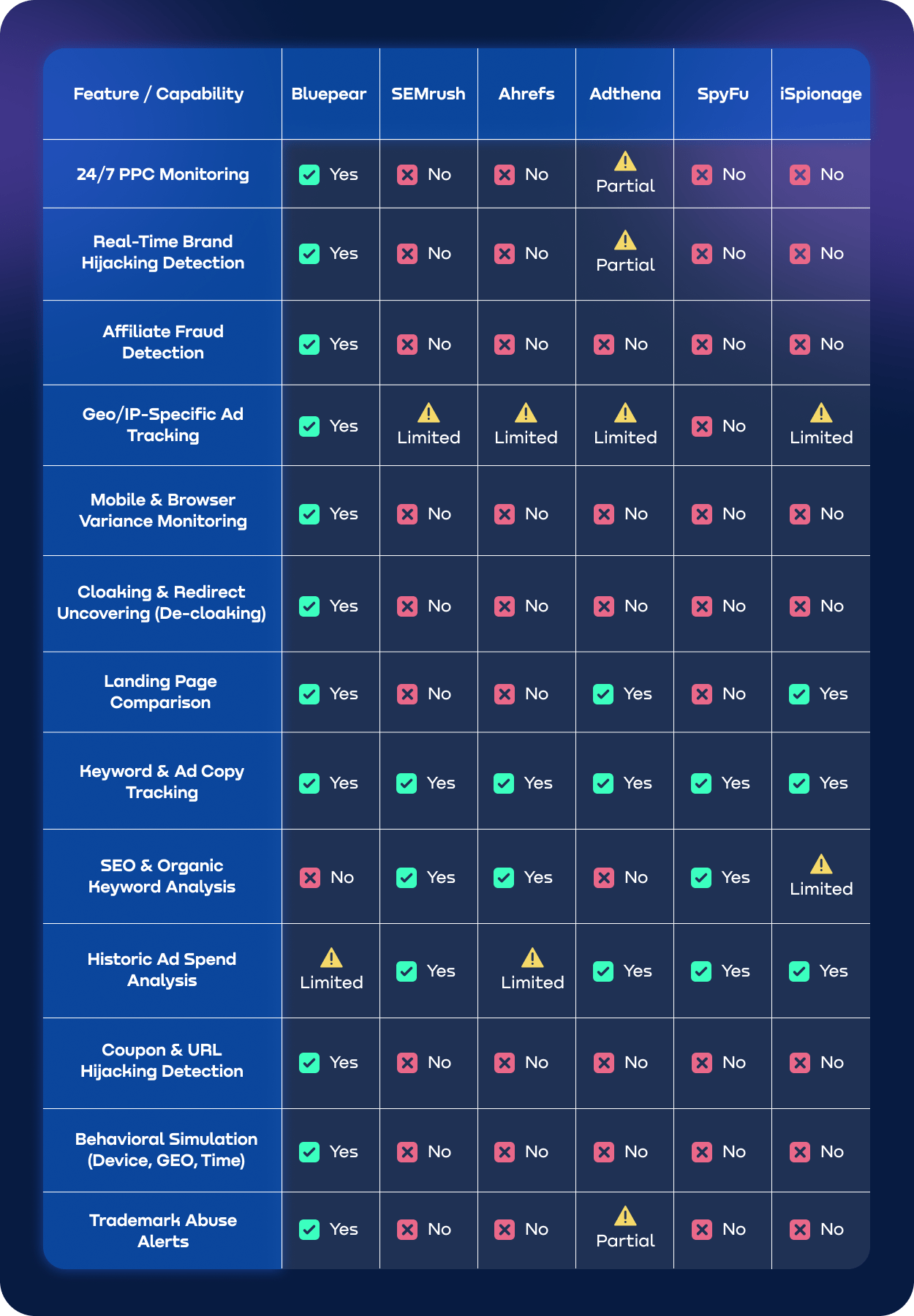
Contents
According to Juniper Research, in 2024, global losses from ad fraud were $84 billion, equivalent to 22% of global digital ad spend. These losses are projected to reach $100 billion by 2025. The problem is, companies don’t lose millions of dollars at once. They may lose $1-2 every day and don’t see it until the brand is really damaged.
Fraudsters do their job amazingly wel l— unfortunately, their job is to steal your money.
In 2025, ad fraud no longer looks like primitive click-boosting by bots. Affiliates launch campaigns targeting specific GEOs and IP ranges that are usually unchecked. They only place ads at night, during hours of minimal activity. They show moderators and people different content.
So, marketers think everything is fine — until their brand CPC skyrockets, their conversion rate drops, or top search positions are quietly taken over by clone ads. Modern problems require modern solutions. That’s why it’s so important to use automated brand monitoring tools.
Some companies do use automated PPC analysis services like Semrush or Ahrefs to enhance their marketing efforts. But here’s the catch: those PPC analysis tools aren’t designed to discover sophisticated fraud.
For example, Semrush or Ahrefs is great for SEO optimization because it's their main focus. But when it comes to de-cloaking scam websites abusing your brand’s name, they are useless. Those PPC analysis services aren’t built to handle this challenge.
You may have the best SEO on your website, but the first place in SERP will be occupied with competitors who bid on your keywords. In this case, what you really need is an in-depth PPC analysis service focusing on your brand’s safety.
In this guide, we’ll compare PPC analysis services and find the best Ahrefs alternative for online brand monitoring.
Why Standard PPC Analysis Tools Fall Short in 2025
Semrush and Ahrefs are classic tools for general SEO and PPC analytics. However, when it comes to identifying PPC violations, their approach has fundamental limitations.

Data update frequency
Semrush and Ahrefs update PPC campaign data maximum once a day, which may not account for short-term or overnight activity by abusive users. This means that temporary manipulations, such as dayparting or short-term campaigns, may go undetected.
In Semrush, data is updated at different intervals. For example, positional tracking is updated daily for 24-48 hours. As for Ahrefs, search volume and cost-per-click (CPC) data updates every few weeks, but at least once a month for each keyword.
Unlike traditional tools, Bluepear doesn’t wait 24 hours to update. Our PPC analytics system scans search results up to 24 times a day — across different GEOs, devices, and browsers — and in high-risk cases, even every minute. That means you catch violations as they happen, not days later. Nothing slips through the cracks.
Lack of real user behavior
Semrush and Ahrefs don’t model real user behavior, including clicks, navigation, and site interactions. This limits their ability to detect cloaking or redirects that are triggered only by specific user actions.
Also, Semrush provides mobile data in 28 regional databases and the ability to track mobile rankings. Ahrefs PPC system doesn’t currently provide full mobile traffic analysis, which creates blind spots in monitoring mobile-only campaigns.
Bluepear imitates user behaviour and detects cloaking. The PPC analytics tool clicks buttons like a real person to check what your customers see. This way, you can be sure that nothing bad is hidden behind a compliant landing page.
No Geo-Targeting or Device-Level Analysis
Abusers often target their campaigns to specific regions or IP addresses. For example, their ads may be displayed only in Brazil while you check your SERPs from the USA. This allows affiliates to bid on your keywords or show aggressive or fake promotions of your brand.
Semrush and Ahrefs PPC systems don’t provide detailed geolocation or IP analysis, making it difficult to detect such targeted abuse.
Bluepear checks SERPs from different devices and locations to catch any possible violations. It;s a built-in feature, so the PPC analytics tool automatically checks a range of GEOs to keep your brand safe.
No cloaking detection functionality
Cloaking is a fraudulent tactic when affiliates set landing pages to show different content for moderators and real users. A landing page with compliant content works as a “cloak” for a website with content violating affiliate program rules. So, you can’t see violations while manually checking your SERPs.
Semrush and Ahrefs PPC don’t have built-in cloaking detection mechanisms, allowing offenders to hide their actions from these PPC analysis tools.
Bluepear is designed to go through cloaking and see the real landing pages. When any violations are found, the PPC analytics tool makes screenshots, URLs, and the affiliate’s ID. You get all the evidence in one report which you can use to sanction the violator.
Comparing Bluepear with Semrush and Ahrefs
As you see from our previous PPC analysis tools overview, Bluepear is a strong Semrush and Ahrefs competitor in PPC monitoring.

Summing up, Bluepear continuously monitors PPC results — checking up to 24 times a day across different devices, browsers, and locations, including mobile. This makes Bluepear not just an Ahrefs competitor or Semrush alternative but a better option for protecting brands online.
Best Semrush and Ahrefs Alternatives for PPC Fraud Detection
There are also other Semrush and Ahrefs alternative tools. Let’s get a quick overview of them:
Adthena. This Semrush competitor is a competitive intelligence platform specializing in search market insights and ad monitoring. It offers detailed data on competitor keyword strategies and market share, helping businesses optimize their PPC campaigns. However, this Semrush alternative focuses more on market analysis than detecting fraudulent or deceptive PPC practices.
While strong for competitive research, Adthena lacks advanced features for brand safety and real-time PPC violation detection, unlike Bluepear.
SpyFu. This Ahrefs competitor provides historical keyword data and competitor ad tracking, allowing users to analyze paid search strategies over time. It excels in keyword discovery and PPC spend estimation but does not offer dedicated tools to detect affiliate fraud, ad hijacking, or cloaking.
SpyFu is a good Ahrefs alternative as it’s useful for PPC strategy planning. Yet, it falls short in monitoring brand safety and identifying PPC fraud.
iSpionage. This Semrush alternative tracks competitor ads, keywords, and landing pages, offering insights into PPC and SEO tactics. It supports funnel analysis and keyword monitoring but does not specialize in uncovering hidden violations or fraudulent activities within PPC campaigns.
It’s good for competitor analysis as a Semrush alternative but not tailored for comprehensive brand protection or PPC violation surveillance. For this purpose, it’s better to opt for Bluepear.
Learn more about available PPC analysis services in our article about Adthena, Brandverity, and Adpolice alternatives.
How Bluepear Tracks PPC Affiliate Fraud Other Tools Miss
Bluepear stands out in the crowded field of PPC competitor monitoring by uncovering affiliate fraud tactics that traditional tools simply don’t detect.
Bluepear tracks your SERPs 24/7 and catches all the violations, compiling evidence reports for you. The tools is a strong Semrush competitor with in-depth PPC analytics functionality:
• GEO targeting. Bluepear combats this by simulating real user agents (devices, browsers, OS) across multiple locations — allowing it to detect campaigns that appear only for specific GEOs or setups.
• Dayparting. Bluepear monitors PPC activity at frequent intervals — including nights, weekends, and low-traffic hours — to catch hidden ads that appear only during off-peak times. No suspicious placement goes unnoticed.
• Brand bidding. Bluepear identifies these deceptive ads by analyzing ad content and behavior across devices and locations in real time.
• Ad hijacking. Bluepear uncovers these by monitoring ad landing pages and comparing them with genuine brand destinations.
• URL hijacking. Bluepear detects these malicious URLs by analyzing landing page authenticity and domain discrepancies.
• Trademark abuse. Bluepear flags such violations by monitoring keyword bidding and ad creatives, ensuring trademark protection across campaigns.
Now you see why it’s not effective to use Semrush or Ahrefs PPC for affiliate fraud detection. To combat fraudsters, it’s vital to “break through” their masks and grey-hat schemes.
When You Need More Than Just a PPC Dashboard
We’ve covered the theoretical part, but what about practice? Tools are only as good as their application. Let's analyze a real-world scenario to see these PPC monitoring solutions in action.
When You Need a Real Semrush Competitor in 2025
In 2024, cybercriminals took over 70,000 domains in a massive campaign, exploiting the trust in well-known brands to carry out fraud and phishing attacks. According to Signifyd, promo code abuse costs retailers billions of dollars annually, with an estimated $89 billion. These are the threats that Semrush or Ahrefs competitors can’t track.
Affiliates can make money by diverting traffic away from your official website to their coupon pages. Here’s a real-life example:
1. Fraudsters create fake coupon websites. They set up landing pages that promise exclusive coupons and deals. They use your trademark, so these pages appear high in search engine results for branded keywords like “YourBrand coupon” or “YourBrand discount.” This is why consistent brand keyword monitoring is essential to spot and stop such abuse early.
2. Searchers go to coupon pages instead of your site. When users look for the best deals, they often click on these fake pages rather than your official website. Since these fake coupon sites capture clicks that would normally go to your site, your organic traffic decreases.
3. Coupon fraud is masked by cloaking. Fraudsters show legitimate content or no content at all to bots while displaying fraudulent offers to real users. This makes it almost impossible for standard PPC analysis tools to detect the problem.
4. Impact on your SEO and budgets. Your rankings may suffer due to lower click-through rates (CTR), further decreasing organic traffic. You overpay commissions to affiliates who don’t really bring you any value.
5. Brand damage. Beyond financial loss, coupon fraud leads to lost sales, lower conversion rates, and damage to your brand’s reputation as customers get frustrated by fake offers or poor experiences on scammy sites.
How automated tools can help you in such a situation?
As for standard PPC analytics services like Ahrefs or some other Semrush competitor, they will show you a decrease in traffic if it happens. But that’s the maximum of what you can get to fight against fraudsters with a Semrush alternative.
Bluepear will show that there’s a coupon website using your brand’s name and stealing clicks. The tool will de-cloak the webpage, gather evidence, and send you a real-time alert. With a full violation report, you can sanction the violator and stop the scam.
PPC Analysis Services Comparison Table

Final Thoughts: Choosing the Right PPC Analysis Service in 2025
Your brand deserves better than just blind bidding. Make sure your paid clicks aren’t going to scammers.
Here’s a checklist for effective brand protection in 2025:
• Implement automated PPC analysis tools that specialize in online brand protection.
• Choose a PPC analytics tool carefully: it must show fraud rather than just PPC bids.
• Don’t rely on basic SEO or PPC analysis tools for fraud detection — they weren’t built for it.
• Track who’s bidding on your brand terms, when, and from where.
• Identify and block cookie stuffing, URL spoofing, and fake coupon abuse.
• Get alert-based reports so you can act fast before fraud impacts performance.
• Audit your affiliate partners regularly — not just performance, but compliance.
Bluepear tracks your SERPs and competitors 24/7. This PPC analysis service is designed for affiliate fraud detection and real-time monitoring.
Blupear frees up your team — just a few clicks needed instead of days of manual monitoring.
FAQ
Why do standard PPC analysis tools fall short in 2025?
Platforms like Semrush and Ahrefs update PPC data only daily and don’t model real user behavior. This means they often miss short-lived fraud, night-only campaigns, cloaking, and GEO-targeted abuse.
How do fraudsters hide PPC violations today?
They run ads only at night, restrict them to certain GEOs, cloak pages, or trigger redirects only for real users. These methods make violations invisible to tools that don’t simulate real browsing.
Why do Semrush and Ahrefs struggle with PPC fraud detection?
Because both tools focus on SEO and surface-level PPC metrics. They don’t click ads, don’t scan multiple GEOs or devices, and can’t de-cloak landing pages — so most violations stay undetected.
What makes Bluepear more effective for PPC fraud and brand bidding?
Bluepear scans SERPs up to 24 times a day, imitates user clicks, checks different GEOs and devices, breaks through cloaking, and captures screenshots, URLs, and affiliate IDs in real time.
Which PPC fraud tactics can Bluepear detect that others miss?
Brand bidding, URL hijacking, ad hijacking, cloaked content, dayparting abuse, GEO-restricted ads, and trademark misuse — including violations that appear only for specific regions or devices.
Why does GEO-targeted monitoring matter for PPC analysis?
Fraudsters often show abusive ads only in markets the brand doesn’t manually check. Without multi-GEO scanning, these campaigns run for weeks unnoticed.
When should brands consider an alternative to Semrush or Ahrefs?
When CPC rises without explanation, competitors appear on branded terms, unusual traffic patterns emerge, or when brands need real fraud detection instead of basic PPC dashboards. Bluepear provides this level of depth.

